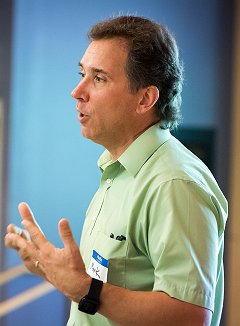Workshop 406: Creating an on-ramp to programming for arts and humanities students with teaspoon languages and custom block languages
Programming is a useful medium for artists. Learning to program provides a useful set of skills and concepts for critical computing scholars and conversational programmers. Introductory computing classes (at both secondary and post-secondary) level focus on job skills in software development or data science, which are different than what arts and humanities students need. We have been developing new introductory computing courses for arts and humanities undergraduate students, explicitly including programming. The courses were designed using participatory methods with faculty who focus on creative expression and justice. The goal was to make them engaging with no requirement for prior programming background or mathematics past algebra. We use teaspoon (task-specific programming) languages and custom blocks in Snap to create a highly-scaffolded on-ramp into programming. These include supports for image processing, language recognition and generation, digital sound manipulation, creating Web pages, building chatbots, and manipulating databases. The workshop will include a presentation of the learning goals that emerged from our participatory design sessions. Participants will use our teaspoon languages and context-specific Snap blocks during the workshop, and also try out the ebooks we use to help students transfer their knowledge to mainstream tools like Python, Processing, and SQL. These activities might also be useful in secondary school computing classes. (Links to all of the tools will be provided, though only some will be used hands-on in the workshop.)
Mark Guzdial is a Professor in Computer Science & Engineering and Engineering Education Research at the University of Michigan. He studies how people come to understand computing and how to make that more effective. He was one of the founders of the International Computing Education Research conference. He was one of the leads on the NSF alliance “Expanding Computing Education Pathways" which helped US states improve and broaden their computing education. He invented and has written several books on the “Media Computation” contextualized approach to computing education. With his wife and colleague, Barbara Ericson, he received the 2010 ACM Karl V. Karlstrom Outstanding Educator award. He is an ACM Distinguished Educator and a Fellow of the ACM. His most recent book is Learner-Centered Design of Computing Education: Research on Computing for Everyone (Morgan & Claypool, 2015). He received the 2019 ACM SIGCSE Outstanding Contributions to Education award.
Sat 23 MarDisplayed time zone: Pacific Time (US & Canada) change
15:30 - 18:30 | |||
15:30 3hTalk | Workshop 406: Creating an on-ramp to programming for arts and humanities students with teaspoon languages and custom block languages Workshops Mark Guzdial University of Michigan | ||
